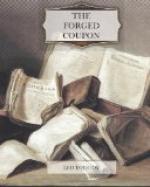Six weeks later he returns homeward the same way, roused from his melancholy torpor by his recent meeting with Natasha.
“The day was hot, there was storm in the air; a slight shower watered the dust on the road and the grass in the ditch; the left side of the wood remained in the shade; the right side, lightly stirred by the wind, glittered all wet in the sun; everything was in flower, and from near and far the nightingales poured forth their song. ’I fancy there was an oak here that understood me,’ said Prince Andre to himself, looking to the left and attracted unawares by the beauty of the very tree he sought. The transformed old oak spread out in a dome of deep, luxuriant, blooming verdure, which swayed in a light breeze in the rays of the setting sun. There were no longer cloven branches nor rents to be seen; its former aspect of bitter defiance and sullen grief had disappeared; there were only the young leaves, full of sap that had pierced through the centenarian bark, making the beholder question with surprise if this patriarch had really given birth to them. ‘Yes, it is he, indeed!’ cried Prince Andre, and he felt his heart suffused by the intense joy which the springtime and this new life gave him . . . ’No, my life cannot end at thirty-one! . . . It is not enough myself to feel what is within me, others must know it too! Pierre and that “slip” of a girl, who would have fled into cloudland, must learn to know me! My life must colour theirs, and their lives must mingle with mine!’”
In letters to his wife, to intimate friends, and in his diary, Tolstoy’s love of Nature is often-times expressed. The hair shirt of the ascetic and the prophet’s mantle fall from his shoulders, and all the poet in him wakes when, “with a feeling akin to ecstasy,” he looks up from his smooth-running sledge at “the enchanting, starry winter sky overhead,” or in early spring feels on a ramble “intoxicated by the beauty of the morning,” while he notes that the buds are swelling on the lilacs, and “the birds no longer sing at random,” but have begun to converse.
But though such allusions abound in his diary and private correspondence, we must turn to “The Cossacks,” and “Conjugal Happiness” for the exquisitely elaborated rural studies, which give those early romances their fresh idyllic charm.
What is interesting to note is that this artistic freshness and joy in Nature coexisted with acute intermittent attacks of spiritual lassitude. In “The Cossacks,” the doubts, the mental gropings of Olenine—whose personality but thinly veils that of Tolstoy—haunt him betimes even among the delights of the Caucasian woodland; Serge, the fatalistic hero of “Conjugal Happiness,” calmly acquiesces in the inevitableness of “love’s sad satiety” amid the scent of roses and the songs of nightingales.
Doubt and despondency, increased by the vexations and failures attending his philanthropic endeavours, at length obsessed Tolstoy to the verge of suicide.




